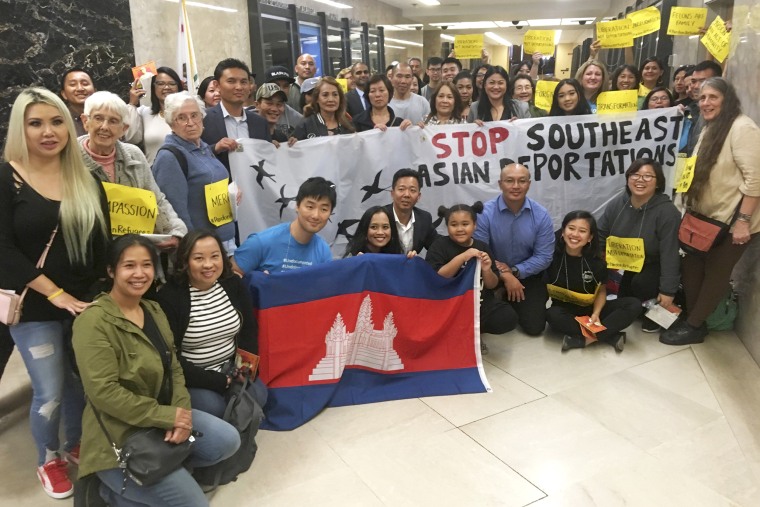Lawmakers in Congress introduced a bill on Tuesday that aims to keep more Southeast Asian refugee families together, advocates say.
The Southeast Asian Deportation Relief Act would place limitations on the Department of Homeland Security’s authority to deport refugees from Cambodia, Vietnam and Laos. The bill could have a significant impact for an estimated 15,000 Southeast Asian refugees, roughly 80% of whom were convicted of a crime and have completed their sentences but have final orders of removal and face deportation.
Quyen Dinh, executive director of the organization Southeast Asia Resource Action Center, which advocated for the bill, said that the legislation would be a way for the U.S. to honor its “unique responsibility to stay accountable to the trauma that had been created.”
She explained refugees who commit crimes are penalized with a sentence and an order of removal — something that’s referred to among activists as “double jeopardy.”
“In our system, a person can make a mistake. They can pay their debts to society and move on and build a new future. They should not be … deported to a society where they no longer belong and may not even remember,” Rep. Alan Lowenthal, D-Calif., said during a press conference at the House Triangle. “It is profoundly wrong for us to send refugees where their human rights are not protected and guaranteed.”
The legislation would prevent DHS from detaining or deporting Southeast Asian refugees who arrived in the U.S. prior to 2008. Additionally, it would put an end to in-person check-ins with the Immigration and Customs Enforcement agency, a practice that ultimately creates prolonged anxiety within families, advocates say. It would also authorize permanent employment eligibility for those with final orders of removal.
While the majority of Southeast Asian refugees who face deportation have spent years without any contact with the criminal justice system and have become involved members of their communities, Dinh said they continue to feel perpetual anxiety that they will be separated from their families. ICE check-ins are sporadic and they evoke panic, she said.
“The fear and the trauma that comes with in-person check-ins means that you leave your home, you leave your family, you drop off your kids not knowing if you’re going to be detained,” Dinh said. “And from that moment, your family has to have a rapid response backup plan in case you are detained.”
In addition to contending with additional punishment, Dinh said that refugees’ green cards are revoked when they commit crimes, effectively making it difficult to secure employment. Most have to apply for work authorization annually, undergoing the application process every six months.
“So families have to go through this process over and over and over again when they’re trying to find work and oftentimes, folks actually end up working for employers without as many benefits because these are employers who don’t require that authorization,” Dinh said.
When it comes to refugees who have been entangled with the criminal justice system, their circumstances cannot be removed from their stories, Dinh said. The U.S. wars in Southeast Asia in the 1960s and '70s ultimately resulted in the resettlement of the largest refugee population in the nation’s history.
“This is our opportunity to really tell the story of how our communities are such a uniquely American experience, and how we’ve been devastated uniquely by our immigration policies,” Dinh said.
Many from these communities, she said, were placed in areas that lacked the infrastructure and support necessary to heal trauma from war, genocide, displacement or poverty. The impacts are far-reaching. The Hmong community, who fled primarily from Laos, for example, continues to fare the worst across nearly all measures of income, compared to all other racial groups. An estimated 60% are considered low-income and a quarter live in poverty.
“It led them to crimes of poverty and youth and survival that they have served decades ago. And that still threatens their lives every single day through these deportation orders to countries that they fled as refugees,” Dinh said.
